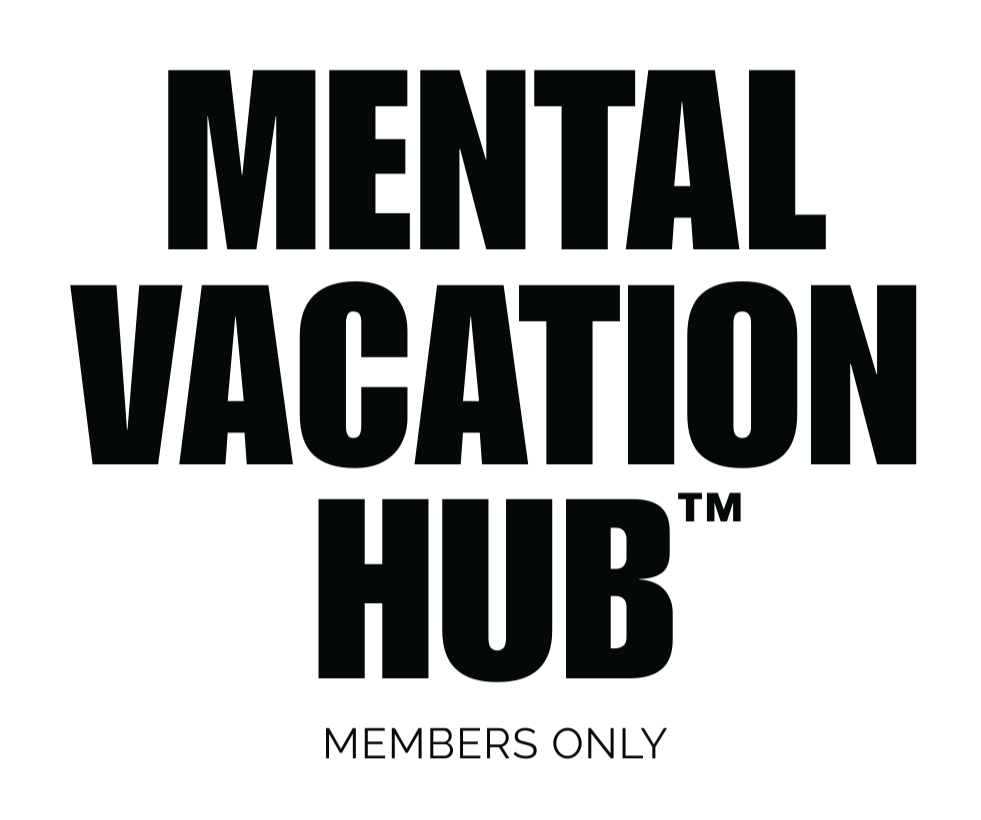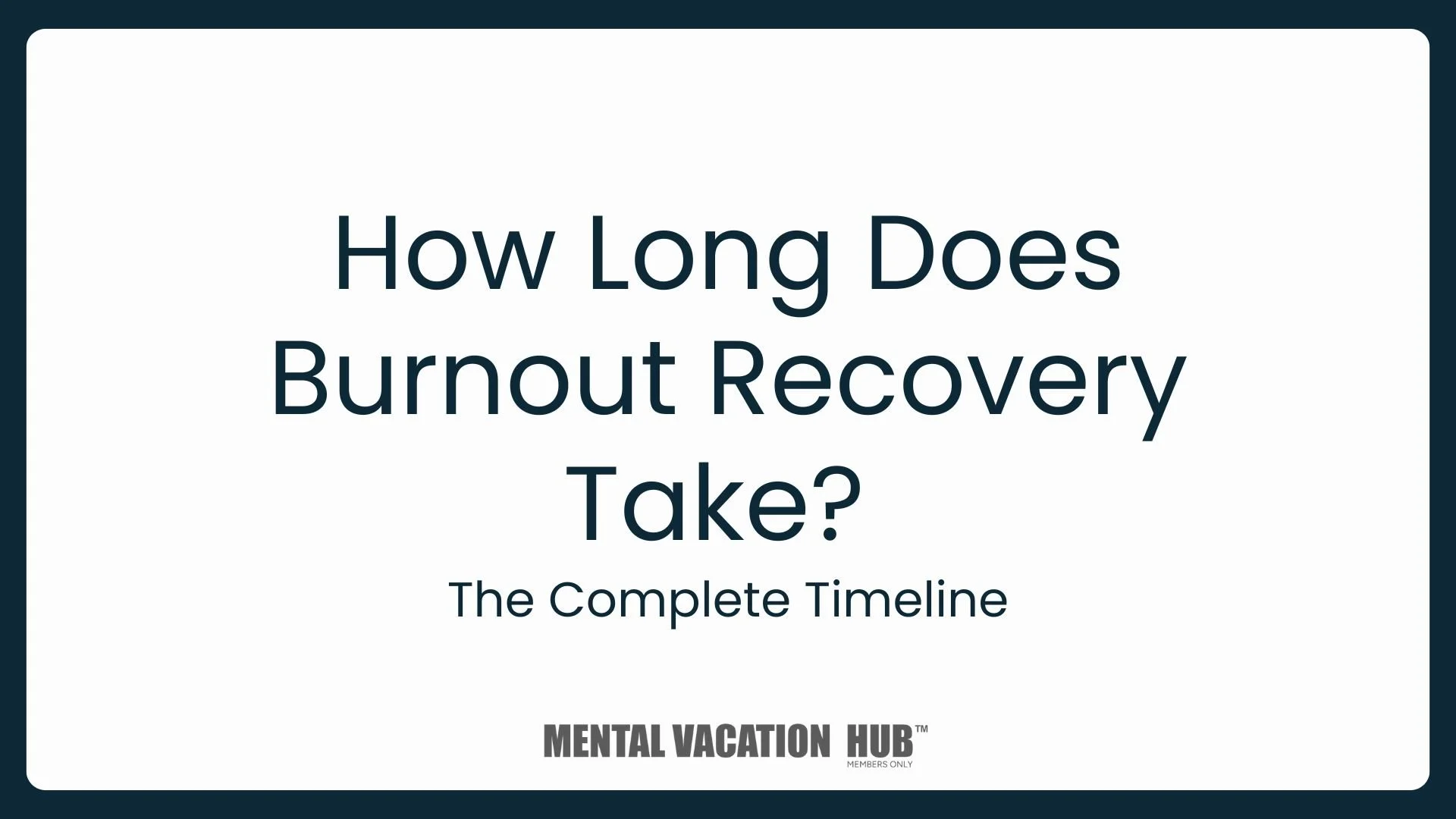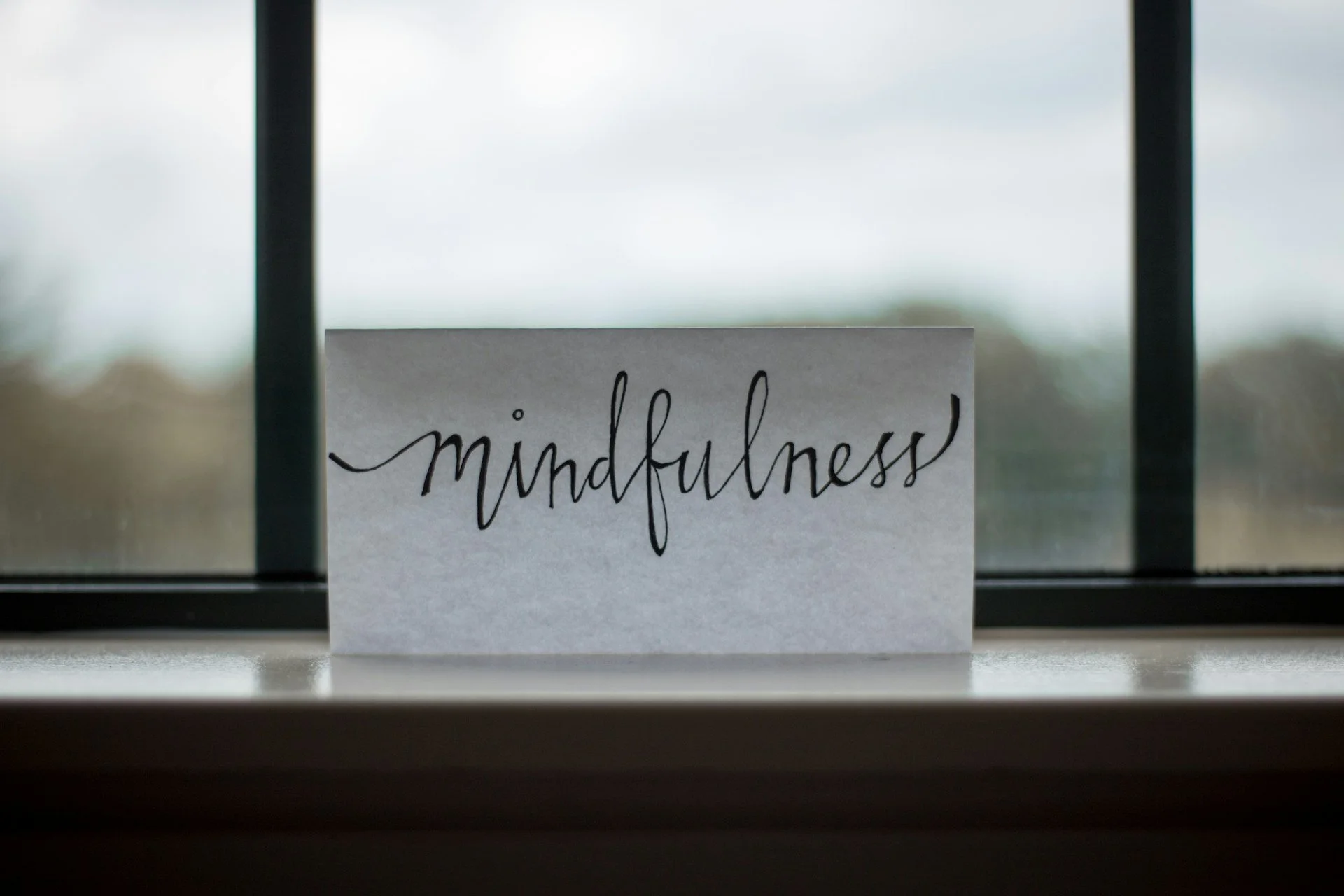How Long Does Burnout Recovery Take? The Complete Timeline
The question lands in your inbox at 2 AM.
You're scrolling Reddit at midnight, exhausted, wondering: How long will this actually take?
You've already taken time off. You've already tried meditation. You've already told yourself you'd slow down. But you're still tired. Still foggy. Still not yourself.
So you search: "How long does burnout recovery take?" And the answers vary wildly. Six weeks. Six months. Two years. Some say it depends. Others say it's different for everyone.
They're all right. And that uncertainty? It's part of the problem.
Here's what the research actually shows - and what real people are experiencing.
The Short Answer (And Why It's Incomplete)
If you're looking for a number: Burnout recovery typically takes 3 to 24 months, depending on severity. But that's like saying "travel takes time": technically true, completely unhelpful.
The real answer is messier. It depends on how deep you fell, how quickly you caught it, and most importantly: what you're actually doing to recover.
Severity Matters More Than Time
Research from burnout specialists shows recovery timelines vary dramatically based on how severe your burnout is:
Mild Burnout:
2–12 weeks. You caught it early. You're tired, slightly cynical, but still functional. A real break—not just a weekend—plus some intentional changes can shift things quickly.
Moderate Burnout:
3–6 months. You've been running on fumes for a while. Energy is depleted, cynicism is real, and effectiveness is dropping. You need actual rest plus structured support to rebuild.
Severe Burnout:
6 months to 2+ years. You're in crisis. Cognitive fog, physical symptoms, and emotional numbness. Recovery isn't linear. You'll have good weeks and brutal weeks. This requires professional support, lifestyle overhaul, and patience.
The problem? Most executives don't realize they're in severe burnout until they're already there.
What Real People Are Actually Experiencing
Reddit and Quora are full of people tracking their recovery in real time.
Their experiences reveal what clinical timelines often miss: the emotional reality of getting better.
"True burnout may take a very long time to recover, several months even. Like a break-up from a great relationship, you need space/time to heal."—Reddit, r/cybersecurity
This comparison is more accurate than most clinical definitions. Burnout isn't just fatigue. It's a rupture in your relationship with work, with yourself, with your capacity. That takes time to repair.
"Burnout recovery isn't linear. Some days you feel great, then you crash again. That's normal."—Reddit, r/overemployed
This is critical. If you're expecting a straight line upward, you'll panic when you crash. Recovery looks more like a stock chart than a staircase—overall trending up, but with sharp dips along the way.
"Apparently, it actually takes 2 years to recover from bad burnout. I'm 1.6 years out and I still have bad days (but overall my life is SO good now)."—Reddit, r/AskWomenOver40
Notice the shift here. At 1.6 years, this person still has bad days. But their overall life is "SO good." That's the real marker of recovery—not the absence of hard days, but the return of good days.
"For average level of burnout it is 10 months, for severe level of burnout it takes a minimum of 13 months."—Quora
This aligns with clinical research. But "minimum" is the keyword. Some people need longer. Some recover faster.
The range matters more than the average.
The Research-Backed Timeline
Multiple burnout researchers and clinicians have studied recovery patterns. Here's what they found:
Elite High Performance Framework:
Mild: A few weeks to 12 weeks
Moderate: 3–6 months
Severe: 6 months to 2+ years
Lily Counseling (mental health specialists):
Average: 3–6 months to feel a meaningful shift with intentional rest
Range: "For some people, a few weeks. For others, several months—or longer."
iPractice (burnout recovery platform):
Average: 3 months to 1 year
Jennifer Moss (burnout researcher, Harvard):
"Recovery can take weeks, months, or even years, depending on severity and interventions used."
The consistency across sources? Recovery is measured in months, not weeks.
And severity matters enormously.
Why Recovery Takes So Long (And Why Rest Alone Isn't Enough)
This is where most people get stuck.
They take two weeks off, feel slightly better, and assume they're recovered. Then they go back to the same job, same pace, same triggers—and crash harder.
Recovery takes time because burnout causes real neurological changes. Chronic stress floods your system with cortisol. Your nervous system gets stuck in threat mode. Your brain literally struggles with focus, memory, and decision-making.
You can't think your way out of this. You can't willpower your way out. You need actual time for your nervous system to downregulate.
But here's the critical part: time alone doesn't heal burnout.
What matters is what you do with that time.
The Five Variables That Actually Determine Your Recovery Speed
Not all recovery timelines are equal. These factors dramatically impact how long you'll actually need:
1. How Long You've Been Burning Out
If you've been running on empty for two years, recovery takes longer than if you caught it after six months. Your nervous system has been dysregulated for longer. Your reserves are more depleted. The deeper the hole, the longer the climb.
2. The Resources You Have Access To
Can you afford to take time off? Do you have mental health support? Do you have a partner or family who can help? Do you have financial cushion? These aren't luxuries—they're recovery infrastructure. Without them, recovery is slower and harder.
3. Whether You're Actually Changing Your Triggers
This is non-negotiable. If you rest for three months, then return to the exact same job with the exact same workload and the exact same boss, you'll burn out again. Real recovery requires identifying what broke you and changing it. That takes time to figure out, and courage to implement.
4. The Quality of Your Rest
A week off where you scroll your phone and worry about work isn't recovery. Real recovery requires: removing yourself from triggers, engaging with nature or reading, moving your body, journaling, connecting with people who matter, and sleeping well. It's active rest, not passive escape.
5. Whether You Have Underlying Conditions
If you're also dealing with depression, anxiety, ADHD, or other health factors, recovery is more complex.
You're not just recovering from burnout - you're addressing the conditions that made you vulnerable to it in the first place.
The Non-Linear Reality: Why You'll Have Setbacks
Here's what the research doesn't always capture: recovery isn't a straight line.
You'll have weeks where you feel genuinely better. Energy returns. Clarity comes back. You think you're done.
Then something triggers you. A work email. A deadline. A conversation. And you crash. Hard. You feel like you're back at square one.
You're not.
Setbacks are normal. They're part of recovery, not a sign of failure. What matters is that the baseline is improving. The crashes are less severe. The recovery between crashes gets faster.
Think of it like physical rehabilitation. You don't go from a broken leg to running a marathon in a straight line. You have good days and bad days. Some days you regress.
But overall, you're getting stronger.
How to Know You're Actually Recovering
Recovery is about specific markers returning:
Energy Returns (Gradually)
Not all at once. But you notice you can work for four hours without collapsing. Then five. Then a full day. You're not bouncing back to your old capacity—that's not the goal—but you have some energy again.
Cognitive Fog Lifts
You can focus on a task for 30 minutes without your brain shutting down. You remember things without writing them down. You can make decisions without it feeling impossible.
Cynicism Softens
You stop seeing everything as pointless. You care about things again. Not everything—you're still protective of your energy—but some things matter again.
Sleep Improves
You're not waking up at 3 AM with anxiety. You're sleeping more deeply. You wake up slightly less exhausted (though still tired—that takes longer).
Physical Symptoms Ease
The tension headaches decrease. Your stomach settles. Your body stops being in constant fight-or-flight mode.
You Can Handle Small Stressors Again
A delayed email doesn't send you into panic. A mistake doesn't feel catastrophic.
You have some resilience back.
Timeline Expectations by Severity
Here's what to realistically expect:
Mild Burnout (2–12 weeks)You'll start feeling noticeably better within 2–3 weeks of real rest.
By week 6–8, you should feel substantially recovered.
By 12 weeks, you're mostly back to baseline, though you'll be more protective of your energy going forward.
Moderate Burnout (3–6 months)Weeks 1–4: Rest and stabilization. You're just trying to stop the bleeding.
Weeks 4–8: First signs of improvement. Energy slightly returns. Brain fog starts lifting.
Weeks 8–16: Meaningful recovery. You're functional again, though still fragile.
Weeks 16+: Rebuilding capacity. You're ready to think about returning to work or making changes.
Severe Burnout (6 months to 2+ years)Months 1–2: Crisis management. You're just surviving.
Months 2–4: Stabilization. The acute crisis passes. You're still very depleted.
Months 4–8: First real improvements. Energy returns in small amounts. Cognitive function improves.
Months 8–12: Rebuilding. You're functional for most days. Bad days still happen.
Months 12+: Integration. Recovery is becoming your new normal. But you're still protecting your energy fiercely.
The Critical Question: Can You Recover Without Leaving Your Job?
Many executives ask this. The answer is: maybe, but it's much harder.
If your job is the primary source of burnout, recovery while staying in that job is like trying to heal a wound while repeatedly reopening it. Possible? Sometimes. Efficient? No.
Some people recover while staying in their role by:
Negotiating reduced hours or workload
Changing their responsibilities
Getting a new manager or team
Setting strict boundaries (and actually enforcing them)
Shifting how they approach the work
But most people need at least a temporary break—sabbatical, leave, reduced hours—to actually recover. Not because they're weak. Because burnout is a system-level problem that requires system-level change.
What Actually Speeds Up Recovery
The research shows certain interventions genuinely accelerate healing:
Removing TriggersThis is non-negotiable. You can't recover while still in the environment that broke you.
Nervous System RegulationGuided mindfulness, body scans, time in nature, movement—these aren't nice-to-haves. They're essential. They tell your nervous system it's safe again.
Sleep QualityNot just quantity. Deep, restorative sleep is where actual recovery happens. This requires addressing sleep hygiene, stress, and sometimes professional support.
Social ConnectionNot surface-level networking. Real connection with people who matter. Isolation deepens burnout. Connection accelerates recovery.
Structured SupportHaving a coach, therapist, or structured program helps you avoid spinning your wheels. You're not just resting—you're actively recovering with guidance.
Nutrition & MovementYour body needs fuel and activation to rebuild. This isn't about fitness. It's about giving your body what it needs to repair itself.
The Bottom Line: What You Actually Need to Know
Burnout recovery isn't fast. It's not a weekend retreat or a productivity hack. It's a genuine healing process that takes months, sometimes longer.
But here's what matters: it does get better.
The research is clear. Real people's experiences confirm it. Recovery is possible. It's just slower than you want it to be, and that's okay.
What determines your recovery speed isn't luck or personality. It's:
How quickly you acknowledge the burnout
What resources you can access
Whether you're willing to change your triggers
How intentional you are about your rest
Whether you get structured support
You can't skip the timeline. But you can optimize it.
Start by being honest about where you actually are. Not where you think you should be. Not where you were before. Where you actually are right now.
From there, recovery becomes possible.
FAQ: Your Burnout Recovery Questions Answered
Can I recover in less than 3 months?
If it's mild burnout caught very early, possibly. But most people underestimate severity. Moderate to severe burnout almost always takes longer than people hope. Expect 3–6 months minimum for meaningful recovery.
Why am I still tired after 6 months?
Because your nervous system is still healing. Fatigue is one of the last symptoms to resolve. You might feel cognitively better before energy fully returns. This is normal.
Do I have to quit my job to recover?
Not necessarily. But you do need to change something significant—hours, responsibilities, boundaries, or environment. Recovering while staying in the exact same situation is exponentially harder.
Is recovery linear?
No. You'll have good weeks and brutal weeks. The overall trend should be upward, but expect setbacks. They're normal and don't mean you've failed.
How do I know I'm recovered?
When energy returns consistently, cognitive fog lifts, cynicism softens, sleep improves, and you can handle normal stressors without collapsing. You won't be back to your old capacity—and that's the point. You're building a sustainable version of yourself.
What if I'm not recovering after 12 months?
Seek professional support. You might have underlying conditions (depression, anxiety) that need treatment. Or your triggers haven't actually changed. A professional can help you identify what's blocking progress.
Learn More About Burnout Recovery
Ready to recover? Get Your Burnout SOS Handbook:

Burnout SOS Handbook: Practical steps to understand, survive, and recover from your burnout. Easy to follow - just right for a brain-fogged head. Start your healing today!
Take the Burnout Test
Our 5-minute Burnout Test cuts through the confusion and gives you a personalized snapshot of where you stand and what comes next.
Start the test →






